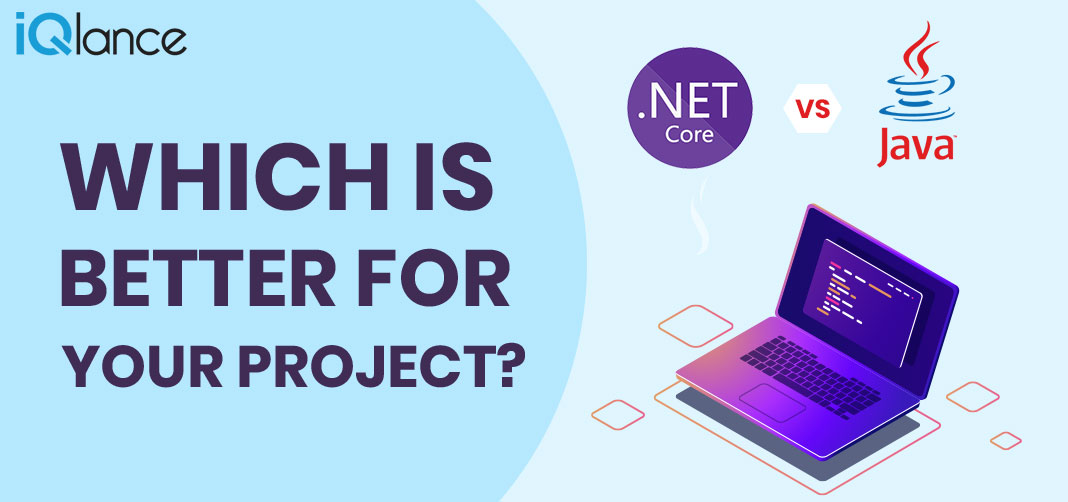
Dot Net core and Java technologies are adopted in many dot net developments based companies not only in India but also worldwide. Both languages are based on object-oriented methodologies and provide enterprise-level development opportunities for different domains. To start work on a particular project, it's always a challenge for the developers to choose the right programming language.
The most successful manner to accomplish this is by developing software companies hiring developers who have experience in these skills with application development. The purpose of using Java and Dot net language is to develop application development as per certain business requirements.
They are an excellent choice for working on complex architectures and high load performance-based applications using the features of modular structure code that provides flexibility, more manageable debugging, and the capability to reuse the code.
Organizations:
We can consider Java as a general-purpose programming language that is based on object-oriented approaches using class-based methods. Java applications are mainly used to compile the byte code that executes in the background on the ava virtual machine (JVM).
The syntax of Java is equivalent to C and C++ and it was released in 1995. Java is preferable to develop the application for Scientific applications, Embedded systems, and middleware products.
Simple: Java is more specific to use, write, compile, debug, and retain than alternative programming languages. It is much easier than other Object-oriented languages as per its automated memory and garbage collection mechanisms.
Object-Oriented: Object-oriented languages define certain features such as classes, objects, abstraction, inheritance, polymorphism using these developers can easily create modular programming and reusability of code.
Secure: It provides the security mechanism on the compiler, interpreter, and runtime environment
Distributed computing – Java has excellent networking capability. It is organized such that distributed computing is manageable with the networking capacity that is naturally incorporated into it.
Platform-Independent: Java provides the convenience of writing programs in various types of OS and software platforms and it runs on any java-compatible browser. This provides the capability to move code efficiently from one computer system to another with its reusability features.
Robust: It is a robust and reliable programming language. Its compilers can easily catch errors in the coding using exception handling, and garbage collection approaches using these qualities make Java a more robust programming language.
Multithreaded: Java is suitable for performing multiple tasks at a single time. Java is used mainly for finance and stock-based use cases with IoT-enabled devices. It is an open-source technology as Oracle OpenJDK (Java Development Kit). It provides the support of Kotlin, Scala, Groovy, etc.
Performance: From the performance perspective, Java consumes the memory and comparatively to actively compiled languages like C or C++.
Memory Management: In Java, memory is contained via garbage collection, whenever the garbage collector executes, it impacts the performance of the application. as per the threads have to be controlled to allow the garbage collector thread to perform.
Look and feel: The default look of the GUI applications written in Java is significantly different from the native look.
: Dot NET Core is an open-source framework and enables the capability to handle various types of applications and run into different types of operating systems such as Windows, Linux, and mac-OS operating systems using cross-platform techniques.
Below are the listed features that involve certain techniques.
Tooling is challenging in Dot NET. As per the regular update by Microsoft, When trying to create an application and trying to discover the root cause for a certain exception, it could be a bit challenging because there is a regular update in the documentation that happens on the latest framework.
The documentation of the ASP.NET Core is not significant when compared to different development technologies. It is being updated very repeatedly and any intervals present are being served actively by Microsoft and other supporters for the project.
The comparison between Java and Dot NET is mentioned below
Basics Microsoft developed .NET as an open-source framework. and Java was developed by James Gosling it is Java as a programming language that Sun Microsystems then established in 1995.
Target Platforms Both of these languages enable to run the application on Linux and Windows. As per the best principal approach, Linux stages are mainly performed by Java developers and on the other hand, Dot net developers are allowed to use it as per the conditions of the defined windows.
Switch & Strings C# languages provide to use a switch statement on a string variable. Java 7 was the primary discharge that allowed this concept, so more founded Java frameworks do not provide the switch expression sentence structure.
Integrated Development Environment The IDE in Java furnishes a compiler, code editor, and debugger to facilitate the function of code building. The platforms are very user-friendly and beginners can effortlessly begin with them. In the case of Dot NET, Visual Studio is incorporated into it which contains many language-specific components. The IDE performs as a numerous workspace interface that supports development actions such as editing and compiling.
Programming Languages Java and .Net core platforms provide support for standard programming languages, using Ruby and Python. One of the distinctive features of Java is that it defines a single language between different platforms using this program can be written with it operate independently across different OS types.
On the different hand, the .NET framework maintains C#, Visual Basic, F# as per the ability of a multi-programming environment, and Java is based on a single programming language that is a generous approach in supporting multiple.
After the detailed level of understanding on Java and .Net core here we will understand the various factors of why Dot net core is better than Java.
Secure Platform
Dot NET is scanned by Microsoft’s Asp.NET as a closed and secure platform. Hence, security-related issues can be easily addressed and handled professionally and can be used with the latest technologies. As java is open-source, but comparatively from the Dot net core, it has fewer resources and professional support. And Java provides regular updates during runtime that can impact the user experience and annoy many users as per the usage. Dot NET doesn’t encounter such difficulties.
Most Suitable Runtime as CLR
Common Language Runtime(CLR) is excellent in multiple technical parameters than JVM and JRE. As JVM is a compiler it completely translates Java Byte Code into exhaustive instruction for or underlying operating systems, not instantly for computing machines. Hence, it is always lagging and requires regular updates for support of better-operating systems. But using CRL of Dot net developers can not face these challenges.
Most appropriate Programming Languages
Java is a programming language on the other side Dot NET is a framework that utilizes C# for writing codes. Java is an easy-to-learn programming language with rigid patterns and C# is flexible as it is a high-level language with excellent Object-Oriented Programming properties. Hence, newbies usually begin by working with Java and then come into C#.
Powerful IDE
Dot NET operates Visual Studio IDE(Integrated Development Environment), which contains all the tools and important features with modern templates and packages with these tools, developers can develop applications in more robust and simpler ways. It lets developers design, program, test, and debug any classification of application targeted at ASP.NET.
Using .net core we can deploy a web application with the best Convenience and flexibility abilities we can consider it as a reliable process.
Here are two ways to deploy the web app:
Framework-dependent deployment: This type of deployment is based on shared-system elements. It can be executed only by the app you have created and 3rd party dependencies. This enables saving memory on host systems.
Self-contained deployment: It is not dependent on shared components. The features of .NET Core runtime and .NET libraries are made different from other .NET Core applications.
The ASP.NET Core stack has robust additional and advanced features These contain:
Here are the examples of various types of projects and use-cases we can start using ASP.Net core.
Mobile: We can develop mobile-based applications on tablets and smartphones. It is classified into two distinct categories.
Web-based Apps: With Web-based apps, we no need to configure and install procedures and they can be executed via a mobile web browser.
Hybrid Apps: It is about the native portable mobile apps, it can be installed on the device, but internally it can be run on the web apps inside of the application container.
Web Apps: These apps are deployed and can be published to a web server and executed via an internet browser utilizing HTTP and HTTPS protocols. We can consider it as a collection of HTML web pages as a single source of UI and can be run or executed on local or remote networks.
Web Services: It is a web method-based Services that combine with the client through a unique address (URL) with the help of SOAP, XML, and HTTP(S) protocols to access or consume additional services, apps, and components.
Internet of Things (IoT) Apps: They are constructed on the Internet of Things devices and can be developed for any specific use case to get the real-time data and collect and store it into the database from various types of business sources such as industrial automation, automotive, healthcare, smart homes and buildings, wearable technology, and other sources.
To secure the data in ASP.NET project, SSL certificate is also necessary, which secures the data between the server and the browser. To secure ASP.NET application, configure application to use SSL certificate.
As a developer's thought process sometimes it is confusing when to choose ASP.Net Core. When we have certain requirements to develop an application from the initial stage then we should go with NET Core, as it’s the future design framework. Or if we have our existing application to migrate using .Net Core it provides the best features of migration and compatible techniques on this.
NET Core is one of the most prevalent and valued web-development frameworks to create web apps. Developers can build robust apps faster with the ASP.NET Core Framework. As it’s a cross-platform open-source project with outstanding technical assistance support.
We hope this article helped you understand the .NET Core Vs Java. Here, we discussed the detailed level of the concept of the benefits and advantages and concepts on which technology is better for your project with the various ways and techniques. It makes your project applications more robust, responsive, flexible, and scalable, which will be helpful to professional developers from .net backgrounds, application architectures, and other learners looking for information on Microsoft .Net core using C#. You will find more useful articles like this one at iQlance. We are a Software Development Company India in India and Hire .NET Developers in India.. Check out the official site for more information.

About the Author:
B.Eng., MBA, PMP®
I’m Krunal Vyas, IT Consultant at iQlance Solutions. Is one of the name of website and Mobile app Development, I’ve helped more than 250+ Clients to build meaningful mobile apps and website. Call me today for FREE CONSULTATIONS:
Have a look at the services and development process of the iQlance solution. See What process we follow for mobile app and software development. Have a look at how we are praised by our clients Start a conversation to innovate your next great idea into reality with us.